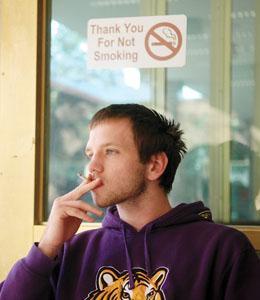Amanda Kasson smokes about half a pack each day — before, between and after classes.Even if the campus was smoke-free, she would “probably still smoke on campus anyway,” she said with a laugh.But realistically, the biological sciences junior said a smoke-free campus would likely result in her smoking less each day — a lot less.”It would probably piss off a lot of people though,” Kasson said.If LSU joins more than 160 colleges and universities across the country that have banned smoking on campus to some degree, Kasson and the 10 percent of students throughout LSU who reported daily tobacco use in the Core Alcohol and Drug Survey conducted in spring 2007 might find their habit going up in smoke.A survey conducted by the American College Health Association-National College Health Assessment in spring 2008 found 42 percent of University students reported smoking cigarettes within the 30 days before the survey. According to an e-mail from University Spokesperson Kristine Calongne, Chancellor Michael Martin does not intend to ban on-campus smoking.”As long as we can protect non-smokers from the impacts of second-hand smoke, I’m not inclined to ban smoking on the campus, as I believe in individual freedom as long as neither imposes cost on others,” Martin said. Judith Sylvester, mass communication professor and founder of Smoking Words, said her organization is working toward the goal of a smoke-free campus. The primary gatekeepers for a smoking ban would be the Faculty Senate or Student Government, Sylvester said.SG President Colorado Robertson said a resolution to ban smoking is not one he would support.”I’m not going to support someone saying you can’t sit on the Parade Grounds and smoke a cigarette,” he said. “I won’t be pursuing smoking bans on campus as long as you don’t do it inside a building or near a door where it doesn’t affect anyone else.”Kevin Cope, Faculty Senate president, echoed most of Robertson’s sentiments — but suggested smokers and nonsmokers find a common ground.”The LSU campus is a gigantic physical plant,” Cope said. “There probably are at least a few places we can designate as a haven for smokers.”SG has received very few complaints about on-campus smoking, Robertson said, naming the walkway in front of Middleton Library as the only place people have complained about. He said signs specifically prohibiting smoking within 25 feet of the doorway have helped to curb problems.The signs in the doorways of on-campus buildings have decreased encounters between non-smokers and smoke, Sylvester said.”Those of us who don’t smoke are still being exposed to it whether we want to be or not,” Sylvester said. “And I think it’s real important for non-smokers to understand that and to be a little bit more vocal about their rights to not be exposed to those things.”In an effort to decrease exposure of second-hand smoke, the University of Arkansas banned smoking July 1. Steve Voohries, Arkansas spokesman, said the decision, announced in May 2007, was met with protest.”There is no safe way to use tobacco,” he said. “Second-hand smoke has been proven to be a health hazard to nonsmokers … As a public university with responsibility for the health of its students, we can’t justify allowing the use of tobacco on campus.”Voohries said Arkansas’ non-smoking policy gained support from University officials after its proposal from the director of health services.For now, Voohries said the policy is not enforced by school officials — it’s just expected to be followed.”It’s not that it’s voluntary, but this is the rule,” he said. “People are expected to follow the rules … People are encouraged to respectfully remind smokers that this is a tobacco-free campus.”The University of Florida is looking to follow the trend. Janine Sikes, University of Florida spokeswoman, an initiative to make Florida a smoke-free campus by 2010 is in the University president’s hands. Julie Hupperich, Student Health Center associate director, said more stringent smoking ordinances could both encourage smokers to quit and benefit nonsmokers.”Second-hand smoke can cause some of the same health effects that smoking can, depending on your exposure,” Hupperich said. “I think people who have made a choice not to smoke really don’t want to be inadvertently exposed to those hazards.”Despite the backing of scientific evidence, some students remain unconcerned.Lauren Nuss, advertising senior, supports the establishment of havens for smokers.”I think there maybe should be some areas [where smoking is banned] because it’s kind of gross,” Nuss said. “Not the main areas of campus but a certain area of the quad.”Diego Zacarias, philosophy freshman, called smoking a “personal choice.””I think it takes away from a traditional part of the college culture,” Zacarias said. “Where would all the smokers go? They wouldn’t stop smoking.”—-Contact Lindsey Meaux at [email protected]
University likely to buck smoke-free trend
November 24, 2008




